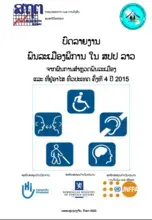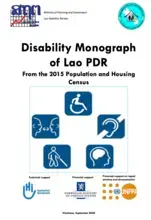Vientiane Capital, 13 July 2021 - The Ministry of Planning and Investment (MPI) and the United Nations Population Fund (UNFPA) marked the World Population Day under the theme: “Protecting the Reproductive health and rights of all people even during COVID-19 - Accelerating the ICPD Implementation.” The event launched the State of the World Population (SWOP) report 2021 and convened a panel discussion towards addressing the COVID-19 impact on the ICPD implementation in Laos.
H.E. Mme Phonvanh Outhavong, Deputy Minister of Planning and Investment stated that “The government has made progress since the International Conference on Population and Development (ICPD) in 1994 and more recently made commitments to ICPD25. We have integrated ICPD into national priorities including the National Socio-Economic Development Plan (NSEDP) and sectoral plans, along with localization of the sustainable development goals.” “Although we made progress towards sexual and reproductive health including the empowerment of women and girls, challenges remain which have been exacerbated by COVID-19 pandemic, discussions with diverse partners such as today’s can help find solutions.”
The COVID-19 crisis has overstretched health systems globally and disrupted essential services including sexual and reproductive health services, services related to women and girls are often the first to be put aside. This can have lasting consequences on the population, such as increase in unintended pregnancies and gender-based violence. Disruptions in access and limitations in mobility can disproportionately impact women and girls including reducing their ability to make decisions about their time, their bodies and health.
The UNFPA flagship report: State of the World Population (SWOP) 2021 indicates that about half of the women worldwide are denied the right to decide on their sexual and reproductive health, including seeking health care or choosing whether and when to have a child. More than two hundred million women globally wish to use contraceptives but do not have access to the services. Disruption or delays of services will further curtail the health and well-being of women and girls, consequences that will impact them, their communities and economies.
In Lao PDR, to highlight and address the rights of women and girls, the innovative Noi framework and Noi ecosystem highlights key data and interventions being systematically undertaken to tackle issues which hold girls back, such as school drop out rates, child marriage, adolescent pregnancy, child labour amongst others.
In Laos, the adolescent birth rate is highest amongst the ASEAN countries with further disparities in country. In rural areas without roads, the adolescent birth rate was 121 percent per 1,000 live births compared to 89 per 1,000 live births in rural areas with roads and 44 per 1,000 live births in urban areas. The adolescent birth rate amongst mothers with no education (155 per 1,000 live births) is six times the rate for mothers who have attained tertiary education (26 per 1,000). To leave no one behind, targeted interventions are required.
Gender-based violence, mental health and psychosocial issues, burden of care for women and girls amongst other issues have also increased during the crisis. According to the information from the Lao Women Union, Lao Youth Union, and Vientiane Youth Center, more than 7,000 hotline and helpline calls have been received since 2020.
H.E. Mme Phonvanh Outhavong said that “we must protect the rights of women and girls, children, adolescent and young people, and mitigate the impacts on their health and well-being. I call for collective action and partnership across all sectors to leverage our existing resources including the demographic dividend, providing information and services on sexual and reproductive health including comprehensive sexuality education.”
Ms. Mariam A. Khan, UNFPA Country Representative acknowledged the tremendous effort that the Lao government has made towards achieving the ICPD. "As the pandemic impacts all sectors, UNFPA is increasing support for actions that protect the progress and gains made in women and girl's health and wellbeing. We are expanding partnerships, leveraging funds and innovating to mitigate impact on women and girls." Ms. Khan urged that "if we are to support the Lao Government to deliver on the national ICPD25 commitments, which are an essential stepping stone to the SDGs, we must prioritize SRH and rights and ensure women's empowerment and autonomy, even during COVID19."
About ICPD
The International Conference on Population and Development (ICPD) was first held in 1994 in Cairo, putting reproductive health and rights, women’s empowerment, and gender equality central to sustainable development. Laos is a signatory of the ICPD and has reaffirmed its commitment to the ICPD25 in Nairobi in 2019. By 2030, the government commits to 1). End maternal mortality; 2). End the unmet need for family planning; 3). End gender-based violence and harmful practices focusing on child marriage and adolescent pregnancy; 4). Fully integrated the comprehensive sexuality education into national curricula nationwide; 5). Increased investment in adolescence and youth, especially young women; 6). Use population data to inform planning for NSEDP, and 7). implement National Population Policy, National Youth and Adolescent Policy, and Youth Law.
About World Population Day
World Population Day is celebrated annually on 11 July to focus attention on the urgency and importance of population issues. The day was established by the then-Governing Council of the United Nations Development Programme in 1989, an outgrowth of the interest generated by the Day of Five Billion, which was observed on 11 July 1987. In Laos, the Ministry of Planning and Investment leads the day's celebration in collaboration with UNFPA. The theme varies year by year. This year emphasizes the urgency of addressing COVID-19 impacts on sexual and reproductive health and accelerating the implementation to realize ICPD commitment by 2030.
About State of World Population (SWOP) Report
The SWOP report 2021 - My Body is My Own: Claiming the right to bodily autonomy is a UNFPA’s flagship report and the first-ever UN report focusing on bodily autonomy. The report highlights why bodily autonomy is a universal right that must be upheld. It also outlines the solutions that are already at hand. Read more or download the full report via: https://bit.ly/3yiBs9S
For more information please contact:
Mr. Sysomphorn Phetdaoheuang,
Director of Department of International Cooperation, Ministry of Planning and Investment
Mr. Phonexay Sithirajvongsa
M&E Officer, UNFPA Laos
Ms. Vanly Lorkuangming
Communications and Partnerships Analyst
UNFPA Laos





